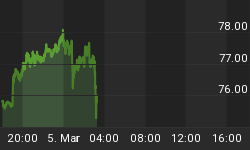Last week, major banks announced they would no longer offer cash for the IOU's written by the state of California. At the same time, China proposed that the U.S. dollar be replaced as the world's official reserve currency. Although seemingly unrelated, these two developments have at their root the same issue: uneasy creditors.
Inspired by Washington's profligacy, California's Democratic majority long pursued a policy of populist politics, supercharged by referendums, which called for increasingly massive expenditures. Exploding deficits were the natural result. Now, it has reached the point where holders and potential buyers of California debt have lost confidence in the state's ability to ever repay.
Ever since President Nixon severed the dollar's link to gold in August 1971, the U.S. has embarked on a monetary policy that has been both a blessing and a curse. The blessing was found in the dollar's reserve status, which allowed for monetary flexibility that no other country could attempt. But therein lay the curse, as gross economic imbalances were allowed to grow unaddressed. Our currency's exportability obscured the fact that our government spending was financed largely by inflation and debt.
It appears that California politicians assumed that they could follow the same model. They began to authorize massive expenditures on freeways, schools, universities, and parks. In their thirst for votes, they introduced a vast array of referendums on entitlement issues. This is quite unlike Switzerland's successful forays into direct democracy, which restricted referendums to election laws and constitutional matters. Absent limits to their purview, California voters inevitably granted themselves new benefits from the public purse, financed by increased taxation and debt. This led to ever higher voter demands and a dramatic rise in real estate values.
In imitating the example of Congress, California's politicians made one crucial error. Like the Administration, they could tax and borrow. But unlike Washington, California could not print money.
Recently, California's politicians have realized that there are limits to taxation, and even debt levels. The real estate recession has hit California particularly hard, while rising unemployment and bankruptcies have reduced the local tax base significantly.
The resulting deficit has scared bond buyers. Creditors were further alarmed when President Obama expressed his unwillingness to divert federal aid to California. Unable to finance its expenditures, California has effectively tried to issue its own currency in the form of IOU's. But banks are now refusing them.
Congress faces a similar predicament. China, the world's largest gold producer and holder of surplus U.S. dollars (or IOU's), is concerned about America's ballooning debt and the depreciating value of the dollar. China is proposing that the dollar be replaced as the world's reserve currency. If this were to happen, the U.S. would lose its "reserve privileges", which would adversely affect its ability to issue new debt and cause consumer prices to soar. Untold damage would be done to both America's morale and its potential for a quick economic revival.
Sacramento might have followed Washington down a blind alley, but it was first to hit the wall. When the central bank can no longer keep the federal government on life support, California's troubles will be America's. Watch the painful process of spending cuts that California is undertaking, as it portends our collective future.
The lesson is that Washington is a bad influence and a bad mentor. Our trust is placed where the governments' behavior justifies it: fast-developing countries, such as Brazil, India and China, as well as major natural-resource suppliers such as Canada, Australia, and New Zealand (collectively known as BIC-CAN).
The BIC-CAN countries offer very appealing investment opportunities, especially in the fixed-income world. Meanwhile, California and U.S. Treasury bonds are just too big a risk.
For a more in-depth analysis of our financial problems and the inherent dangers they pose for the U.S. economy and U.S. dollar, read Peter Schiff's newest book "The Little Book of Bull Moves in Bear Markets." Click here to order your copy now.
For a look back at how Peter predicted our current problems read the 2007 bestseller "Crash Proof: How to Profit from the Coming Economic Collapse." Click here to order a copy today.
More importantly, don't wait for reality to set in. Protect your wealth and preserve your purchasing power before it's too late. Discover the best way to buy gold at www.goldyoucanfold.com. Download Euro Pacific's free Special Report, "Peter Schiff's Five Favorite Investment Choices for the Next Five Years", at http://www.europac.net/report/index_fivefavorites.asp. Subscribe to our free, on-line investment newsletter, "The Global Investor" at http://www.europac.net/newsletter/newsletter.asp. And now watch the latest episode of Peter's new video blog, "The Schiff Report", at http://www.europac.net/videoblog.asp.















